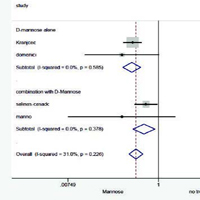Oral D mannose in the prevention and treatment of recurrent urinary tract infections: A review

Published: 12 July 2021
Abstract Views: 2515
PDF: 308
Publisher's note
All claims expressed in this article are solely those of the authors and do not necessarily represent those of their affiliated organizations, or those of the publisher, the editors and the reviewers. Any product that may be evaluated in this article or claim that may be made by its manufacturer is not guaranteed or endorsed by the publisher.
All claims expressed in this article are solely those of the authors and do not necessarily represent those of their affiliated organizations, or those of the publisher, the editors and the reviewers. Any product that may be evaluated in this article or claim that may be made by its manufacturer is not guaranteed or endorsed by the publisher.
Similar Articles
- Esme White, Anna Brewin, Tharani Nitkunan, Urinary tract infections in the intradetrusor onabotulinumtoxinA population , Urogynaecologia: Vol. 35 No. 1 (2023)
- Colin Walsh, Wendy Allen, Katrina Parkin, Chinmoy Mukerjee, Kate Moore, Low-count bacteriuria in refractory idiopathic detrusor overactivity versus controls , Urogynaecologia: Vol. 25 No. 1 (2011)
- Karen De Baets, Ann M. A. De Vylder, Transvaginal urethral diverticulectomy using small intestinal submucosa interposition graft , Urogynaecologia: Vol. 25 No. 1 (2011)
- L. CERSOSIMO, F. CATANZARO, E. IMPARATO, M. MESCHIA, T. MAZZEI, G. NICOLETTI, G. FADDA, G.C. SCHITO, RECOMMENDATIONS FOR THE THERAPEUTIC MANAGEMENT OF NON COMPLICATED URINARY TRACT INFECTIONS IN ADULTS , Urogynaecologia: Vol. 17 No. 3 (2003)
- M. CERVIGNI, G. ORTICELLI, M. BOLOGNA, F. NATALE, E. SALVATORI, G. DI LORETO, P. DIONISIO, SINGLE-DOSE PRULIFLOXACIN VERSUS SINGLE-DOSE PEFLOXACIN IN THE TREATMENT OF ACUTE UNCOMPLICATED URINARY TRACT INFECTION IN WOMEN , Urogynaecologia: Vol. 17 No. 2 (2003)
- Zhuoran Chen, Lucy Bates, Nevine Te West, Kate H. Moore, A 9-year audit of the efficacy of diathermy for cystitis cystica , Urogynaecologia: Vol. 31 No. 1 (2019)
- M. CERVIGNI, G. ORTICELLI, M. BOLOGNA, F. NATALE, E. SALVATORI, G. DI LORETO, P. DIONISIO, SINGLE-DOSE PRULIFLOXACIN VERSUS SINGLE-DOSE PEFLOXACIN IN THE TREATMENT OF ACUTE UNCOMPLICATED URINARY TRACT INFECTION IN WOMEN , Urogynaecologia: Vol. 18 No. 3 (2004)
- Dorota Borawski, Martin H. Bluth, Wellman W. Cheung, Prevalence of urinary incontinence and other lower tract urinary symptoms in patients with uterine myomas , Urogynaecologia: Vol. 25 No. 1 (2011)
- S. Bandiera, G. Giunta, A. Aloisi, M. Arena, I. Iozza, M.G. Matarazzo, R. Morello, G. Raciti, F. Rapisarda, S.G. Vitale, A. Cianci, SURGICAL TREATMENT OF STRESS URINARY INCONTINENCE: A 3-YEAR FOLLOW-UP , Urogynaecologia: Vol. 22 No. 1 (2008)
- Maxime Marcelli, Gilles Karsenty, Jean-Philippe Estrade, Aubert Agostini, Ludovic Cravello, Gérard Serment, Marc Gamerre, Factors influencing sexual function in women with genital prolapse , Urogynaecologia: Vol. 25 No. 1 (2011)
1-10 of 86
Next
You may also start an advanced similarity search for this article.





